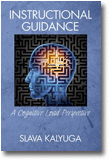
Instructional Guidance
A Cognitive Load Perspective
Edited by:
Slava Kalyuga, University of New South Wales
Published 2015
The book explores a cognitive load perspective on instructional guidance. Cognitive load theory is focused on instructional design implications and prescriptions that flow from human cognitive architecture, and it has become one of the leading theories of instructional design. According to this theoretical perspective, the purpose of instructional guidance is to reduce learner potential cognitive overload by providing appropriate information in the right time and in a suitable format. As the learner’s level of prior knowledge is considered as the main factor influencing this decision, the effect of learner prior knowledge on effectiveness of instructional methods (the expertise reversal effect in cognitive load theory) provides the basic framework for the book.
The fully-guided direct instruction and minimally-guided inquiry (discovery or exploratory) learning are often discussed in instructional psychology literature as examples of approaches with opposed degrees of guidance provided to the learners. This book considers the whole range of the levels of guidance (including intermediate levels) and approaches the problem of balancing learner guidance from a cognitive load perspective. The significance of this approach is in applying our current knowledge of human cognitive architecture to develop an integrated instructional approach bringing together the best features and advantages of direct instruction and inquiry learning.
Both direct instruction and inquiry learning approaches have been around for long time, and their proponents can produce evidence of their effectiveness. This evidence needs to be treated within the context of appropriate learning goals in specific instructional settings for specific types of learners. This book provides an unbiased theoretical framework for managing learner instructional guidance and working principles for selecting appropriate levels and methods of instructional guidance (e.g., sequences of exploratory problems and explicit instruction; forms and levels of embedded guidance; and adapting methodologies) optimal for learners at different levels of prior knowledge.
CONTENTS
Introduction. 1 Instructional Implications of Human Cognitive Architecture. 2 Cognitive Load Aspects of Instructional Guidance:A Traditional View. 3 Modifying Basic Approaches in Cognitive Load Theory. 4 Instructional Consequences of the Modified Theoretical Framework. 5 Learner Prior Knowledge as a Critical Factor in Instructional Guidance. 6 Using Comprehensive Guidance to Achieve Higher-Level Instructional Goals. 7 Attaining Higher-Level Goals in Example-Based Learning. 8 Tailoring Guidance to Levels of Learner Expertise and Specific Instructional Goals. 9 Formatting Instructional Guidance. 10 Toward the Unbiased Framework for Instructional Guidance in Complex Learning. References. About the Author.
-
Paperback978-1-68123-134-1
Web price: $45.04 (Reg. 52.99)
-
Hardcover978-1-68123-135-8
Web price: $80.74 (Reg. 94.99)
- eBook978-1-68123-136-5

- EDU000000 - EDUCATION: General
- PSY021000 - PSYCHOLOGY: Industrial & Organizational Psychology
- PSY000000 - PSYCHOLOGY: General
-
 Distance Learning
Volume 20 #4
Distance Learning
Volume 20 #4
-
 Distance Learning
Volume 20 #1
Distance Learning
Volume 20 #1
-
 Distance Learning
Volume 20 #3
Distance Learning
Volume 20 #3
-
 Forgotten Minorities in Organizations
Forgotten Minorities in Organizations
-
 Lift Every Voice
Radford University Teacher Education Students
Lift Every Voice
Radford University Teacher Education Students
-
 Middle Grades Research Journal
Volume 13 #2
Middle Grades Research Journal
Volume 13 #2
-
 Rekindling Embers of the Soul
An Examination of Spirituality Issues Relating to Teacher Education
Rekindling Embers of the Soul
An Examination of Spirituality Issues Relating to Teacher Education

